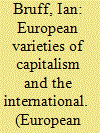|
|
|
Sort Order |
|
|
|
Items / Page
|
|
|
|
|
|
|
| Srl | Item |
| 1 |
ID:
086411


|
|
|
|
|
| Publication |
2009.
|
| Summary/Abstract |
A conventional technocratic wisdom has begun to form that blames the failure of the US led invasion of Iraq on the small number of American troops deployed and the ideological divisions at the centre of the Bush administration itself. This paper argues that both these accounts are at best simply descriptive. A much more sustained explanation has to be based on a close examination of the ideological assumptions that shaped the drafting of policies and planning for the aftermath of the war. The point of departure for such an analysis is that all agency, whether individual or collective, is socially mediated. The paper deploys Antonio Gramsci's notion of 'Common Sense' to examine the Bush administration's policy towards Iraq. It argues that the Common Sense at work in the White House, Defence Department and Green Zone was primarily responsible for America's failure. It examines the relationship between the 'higher philosophies' of both Neoconservatism and Neo-Liberalism and Common Sense. It concludes that although Neoconservatism was influential in justifying the invasion itself, it was Neo-Liberalism that shaped the policy agenda for the aftermath of war. It takes as its example the pre-war planning for Iraq, then the disbanding of the Iraqi army and the de-Ba'athification of the Iraqi state. The planning and these two decisions, responsible for driving Iraq into civil war, can only be fully explained by studying the ideology that shaped them. From this perspective, the United States intervention in Iraq was not the product of an outlandish ideology but was instead the high water mark of post-Cold War Liberal interventionism. As such, it highlights the ideological and empirical shortcomings associated with 'Kinetic Liberalism'.
|
|
|
|
|
|
|
|
|
|
|
|
|
|
|
|
| 2 |
ID:
120165


|
|
|
|
|
| Publication |
2013.
|
| Summary/Abstract |
The IR literature on hegemony rarely combines attention to material power and ideas. Cox's neo-Gramscian work is a rare exception, but it too narrowly construes Gramsci's conceptualization of common sense, reducing it to elite views on political economy. But Gramsci argued that hegemony had to reckon with mass quotidian common sense. If political elites do not take into account the taken-for-granted world of the masses, elite ideological projects would likely founder against daily practices of resistance. In this article, I show how mass common sense can be an obstacle to an elite hegemonic project aimed at moving a great power into the core of the world capitalist economy. In contemporary Russia, a ruling elite with a neoliberal project is being thwarted daily by a mass common sense that has little affinity with democratic market capitalism. Scholarly work on future Chinese, Brazilian, or Indian participation in constructing a new hegemonic order would do well to pay attention to the mass common senses prevailing in those societies
|
|
|
|
|
|
|
|
|
|
|
|
|
|
|
|
| 3 |
ID:
101379


|
|
|
|
|
| Publication |
2010.
|
| Summary/Abstract |
This article develops a framework for analysing the distinctive national trajectories of European varieties of capitalism under the conditioning of 'the international'. It does so through a critical engagement with two prominent historical materialist literatures - transnational historical materialism and uneven and combined development. I argue that, in contrast to these contributions, a nationally-oriented perspective utilizing Antonio Gramsci's writings on 'common sense' has greater potential for narrowing the optic from broader concerns to fine-grained analysis. In particular, I focus on how articulations between the national and the international are constitutive of how humans make sense of the material basis for their existence.The Dutch variety of capitalism is then examined in order to demonstrate the advantages of utilizing this 'common sense' framework for political economy analysis.
|
|
|
|
|
|
|
|
|
|
|
|
|
|
|
|
| 4 |
ID:
177856


|
|
|
|
|
| Summary/Abstract |
The high level of support enjoyed by the authoritarian regime in Russia has been interpreted as evidence of the reactionary character of Russian mass consciousness. We question this view by adopting a neo-Gramscian perspective on popular culture and common sense. We view common sense as protean, combining incongruous beliefs and ideological elements. Our study of Russian women’s fiction finds that contrary to the canons of the genre, Russian authors often display their ideological preferences openly. These can be either pro-government or oppositional, which, given the wide appeal of this literature, suggests that Russian mass common sense is politically diverse.
|
|
|
|
|
|
|
|
|
|
|
|
|
|
|
|
| 5 |
ID:
190425


|
|
|
|
|
| Summary/Abstract |
This article investigates the link between growing precarity – associated with the process of neoliberal economic globalization – and growing Islamist tendencies in Indonesian society, through a case study of app-enabled transport workers. It applies a Gramscian notion of common sense to understand workers’ responses to their experiences of socio-economic marginalization and the articulation of their grievances. The combination of the near hegemony of a neoliberal worldview that encourages individual entrepreneurial prowess and an Islamist focus on moral self-cultivation inadvertently contributes to workers’ normalization of their precarity, furthering the atomization of the workforce. It also helps provide the setting for mobilizations of the urban precariat under Islamic banners, without challenging the imposition of neoliberal ideology on work and life.
|
|
|
|
|
|
|
|
|
|
|
|
|
|
|
|
| 6 |
ID:
161746


|
|
|
|
|
| Summary/Abstract |
Courts routinely resolve factual disputes as an adjunct to settling legal controversies, and such fact-finding frequently involves scientific and technical evidence. It is important to ask what intellectual resources judges bring to this task. Instead of assessing how much science judges know or understand, this essay focuses on the judge's role in articulating and reinforcing prevailing cultural attitudes toward science. Background judicial assumptions matter at three significant junctures. First, judges maintain the lay-expert boundary by deciding whether an issue demands expert testimony at all. Second, judges act as epistemological gatekeepers, by determining which expert claims and ways of reasoning are entitled to deference and which are not. Third, judges decide how to classify and categorize things of uncertain ontological status as a prelude to applying legal rules. Each kind of decision offers a window into judicial common sense, a relatively neglected topic in studies of law and science.
|
|
|
|
|
|
|
|
|
|
|
|
|
|
|
|
| 7 |
ID:
101041


|
|
|
|
|
| Publication |
2010.
|
| Summary/Abstract |
This article examines the feedback loop between governmental technologies of enumeration and surveillance and Hindu nationalist common sense that creates and sustains what I call "demographic anxiety" about Bangladeshi immigrants and Indian Muslims in the north Indian city of Jaipur. A series of bombings in 2008, rapidly and erroneously attributed to Bangladeshi infiltrators, brought to light the role of these forms of knowledge in struggles over city space and possible urban futures in Jaipur, as well as an incoherent but widespread construction of the demographically aggressive Muslim. I argue that "Bangladeshi" has thus become a mobile signifier that catches up disparate ways of "knowing" local populations. Drawing on personal and research experiences in Jaipur City and newspaper and other media accounts of the bombings, I track the mobilization of this signifier and its material consequences, particularly as they pertain to the fate of Jaipur's "Bangladeshi Basti," which became the site of intense police scrutiny in the aftermath of the bombings. I pay special attention to the ways in which the limits of governmental practices of legibility, such as identity documentation, produce both the will to statistical knowledge and a widespread reliance on common sense that reinforce one another.
|
|
|
|
|
|
|
|
|
|
|
|
|
|
|
|
|
|
|
|
|